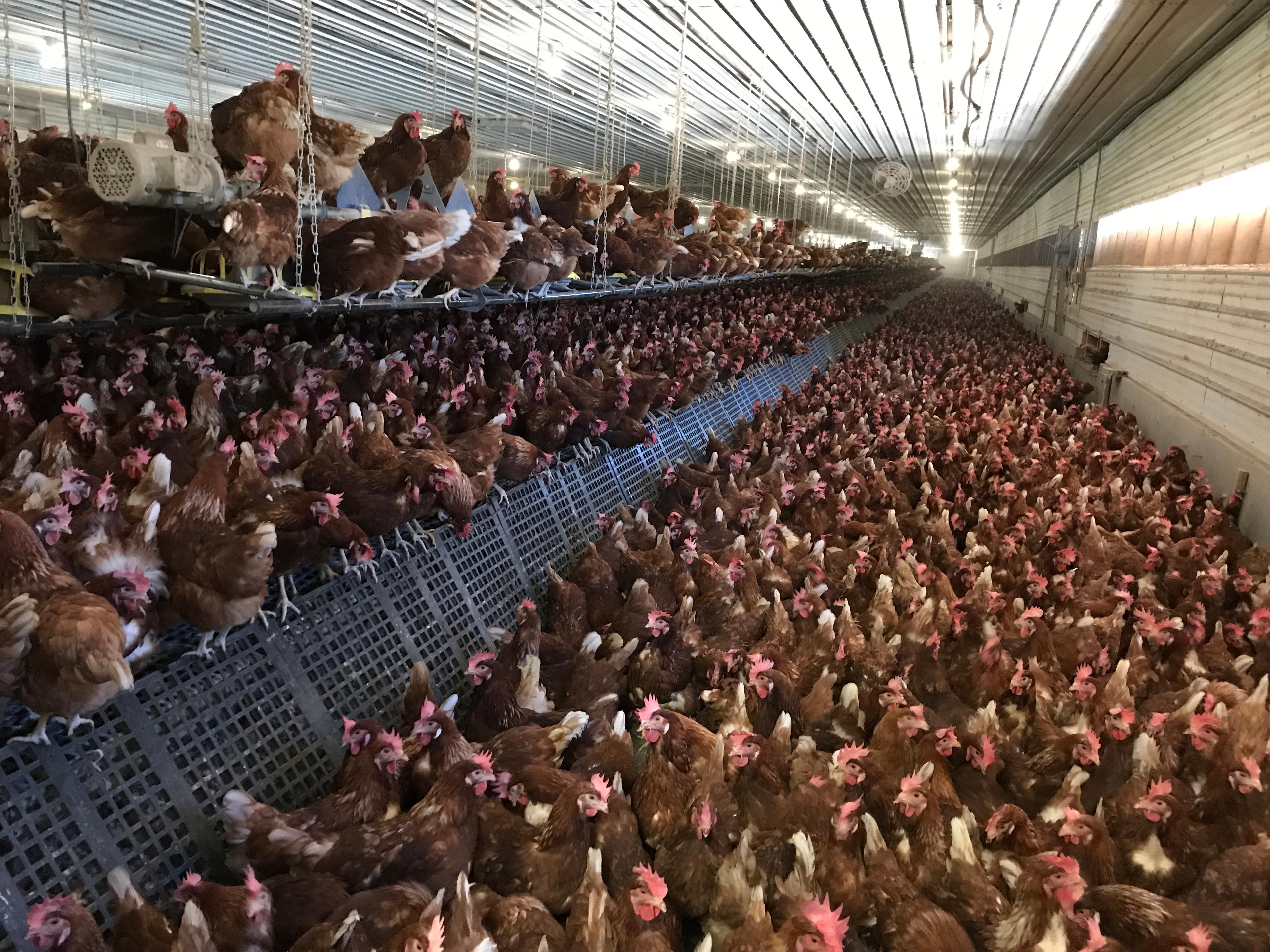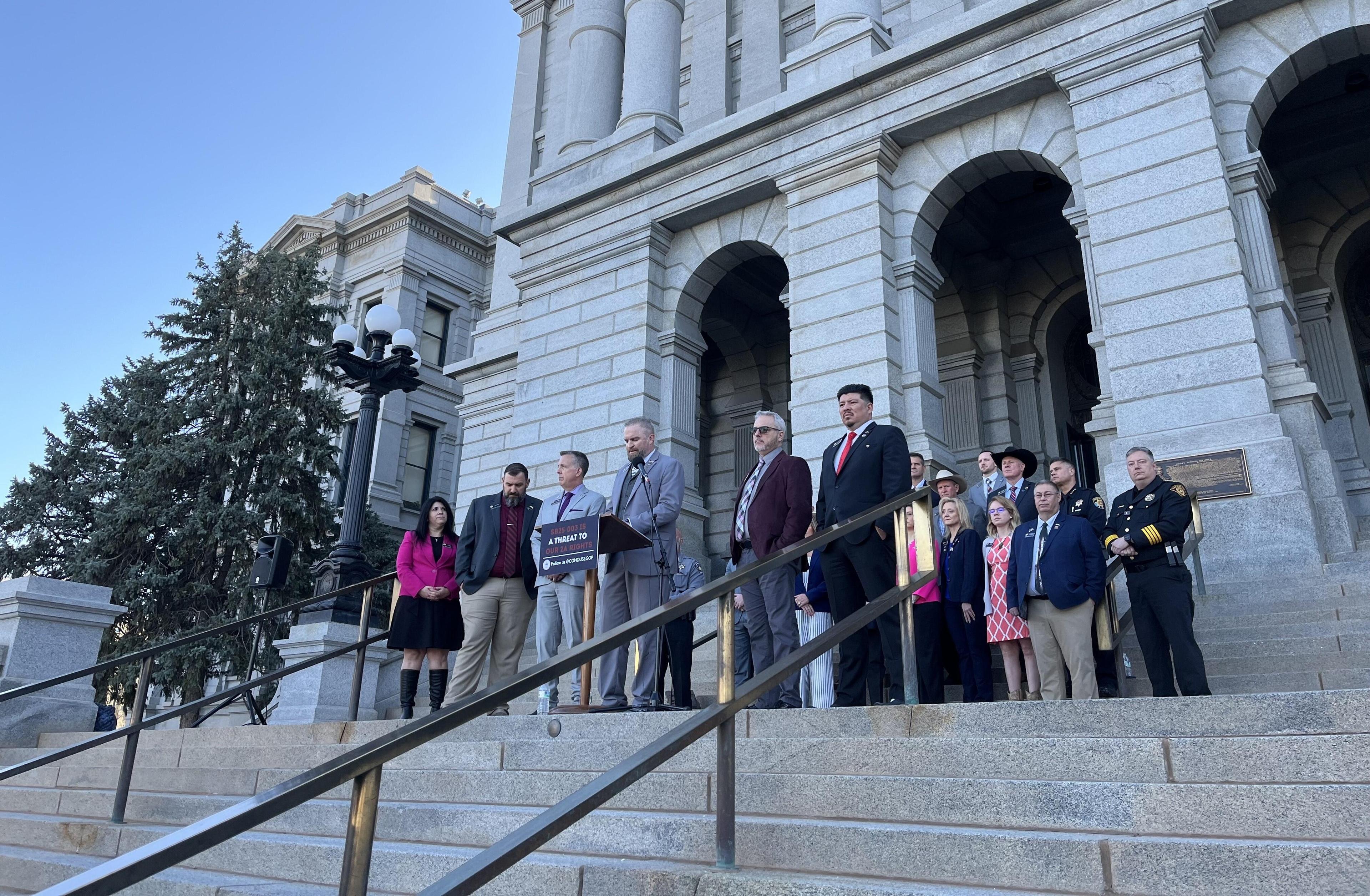

It’s no secret that farming operations can produce some gross smells and loud noises alongside those fresh eggs and produce. As urban and suburban growth encroaches on rural areas, that can become all the more obvious.
“Right to Farm” laws were put in place in the 1970s and 80s when urban sprawl started to invade areas of agriculture. All 50 states have some version on the books.
In Colorado, the law protects farmers and ranchers from the complaints that any new neighbors might have about living next to an agriculture operation, like the smell of manure or cattle on the road.
Some parts of the state have their own “Right to Farm” legislation. On the Western Slope driving into Ouray, the county line sign reads “Welcome to Ouray County: A Right to Farm County.”
Cindy McKee, a teacher in Crested Butte, has wondered for nearly 20 years what these signs mean. McKee submitted her question to CPR’s Colorado Wonders project.
“I’m certain that there must have been a lot of work that went into designating a county in that particular way,” McKee said.
And she’s not wrong. To learn the story, McKee met with Barbara Weber. Weber is retired and now lives in Montrose, but for decades she helped run her family’s ranch outside of Ridgway. Weber says that in the 90s, Ouray County was changing fast as more people visited and moved to the area.
“We felt like the newcomers needed an education about being in an agricultural community,” Weber said. “And that came from the unhappiness of ranchers not having their property rights respected.”

Neighbors were letting their dogs run freely. Visitors were camping on private land.
“One time we had a guy out in our hay field where we were growing a crop, and he had his boy were flying one of them big airplanes,” Weber said. “That’s our backyard!”
State law had already been in place for 20 years, but Weber wanted to know what farmers and ranchers in Ouray would like to see in a county “Right to Farm” policy. After speaking with locals about their growing concerns, Weber helped craft the language:
“Landowners, residents and visitors must be prepared to temper their urban sensitivities, and accept the activities, sights, sounds and smells of rural Ouray County, and should be aware of some of the potential conflicts from agricultural rural living.”
Weber gives examples, like slow-moving farm machinery on highways or the smoke and smell from controlled ditch burns. These issues are usually defined as nuisances. State “Right to Farm” laws essentially allow farming and ranching activity to be a nuisance as long as what’s causing the sound or smell is reasonable and normal and not hurting the environment.
These laws haven’t really been put to the test much in Ouray. But just an hour north in Delta County, a 7-year legal battle turned “Right to Farm” into a rallying cry, while others cried foul.
In Hotchkiss, Edwin Hostetler owns an organic, free-range egg facility with 15,000 hens. He also does construction, raises cattle and runs a feed mill. He’s owned the land for more than 20 years, but didn’t get into the egg business until 2012. His family wanted to try something new and eggs make good money.

But a group of neighbors took him to court over health concerns, and the judge ordered the operation shut down.
“I actually probably wouldn’t have went on with it, if it wouldn’t have been for several local guys that said that you can’t let this go,” Hostetler said. “It’s going to be a bad situation if you let it go. It’ll be cattle next, it’ll be something else next.”
Community leaders and locals feared that losing this case meant more agriculture operations would be shut down. They were also afraid it would send a message—that Delta County doesn’t support your right to farm.
Hostetler and the county appealed the lawsuit and won with the help of an amicus brief from Gov. Hickenlooper, the Colorado Department of Agriculture and the Colorado State Department of Health and Environment.
But Susan Raymond, the neighbor who lead the charge against the chicken operation, wasn’t a newbie to the county. Her father purchased the land before Hostetler did. His ashes are buried underneath the property’s large cottonwood tree.
Raymond moved back here in the 80s to set up her vet clinic after her father passed away. She also breeds and sells horses. When the chickens came in 30 years later, Raymond said the feathers, dust and stink made her life miserable. But it was also miserable to be the one fighting against the farm.
“It became a political nightmare,” Raymond said. “A smear campaign and a false narrative about the ‘Right to Farm.’ And I kept saying, ‘What about my “Right to Farm?”’”
She feels the law’s intentions have shifted.
“I think it should be renamed ‘Right to Harm.’ It’s been used as a sword instead of a shield. Where’s my protection?” Raymond said.

When she lost the appeal, she took Hostetler back to court. She argued that the facility causes her and her animals serious health issues, and that it’s lowered the value of her property.
She lost again, and said the fight changed her relationship with her community. Clients stopped using her veterinary services and people confronted her in public. She said it’s because her case was framed as a threat to people’s “Right to Farm.” Rallys and fundraisers for Hostetler were advertised in local papers, and fliers put up around town. One reads:
“In September of 2011 the Right to Farm came under attack … this could happen to any one of us.”
The Delta County Farm Bureau organized some of these fundraisers. Olen Lund is the president, and is currently running as a Republican for State Senate District 5. He was also one of the county commissioners that first approved Hostetler’s egg facility, but wasn’t in office when the city appealed the case.
Lund also grows alfalfa, and said without farming in Delta County, “Our whole quality of life goes away.”
“Farming creates dust, farming creates smell. And if every farmer has to be sure that there is no dust and that there is no smell, it'll put them out of business,” Lund said. “So then there will be no farming. So then where are we as a society?”
These worries aren’t just in Colorado. Rusty Rumley is with the National Agricultural Law Center, and said “Right to Farm” questions are “probably easily one of the top 10 questions we get from across the country.”
The law doesn’t do as much to protect farmers as people might thinks it does, Rumley said. It isn’t designed to protect farmers and ranchers from environmental impacts or causing health issues.

That’s not how people on the losing side of these conflicts feel. Especially against massive, corporate operations more common in the South. But recently, courts have ruled in favor of neighbors, who sued the corporation instead of the farmer.
jury found Smithfield Foods owed their neighbors more than $450 million in damages for failing to stop smells and other nuisances—complaints that would usually fall under the “Right to Farm” law. These cases have some states scrambling to try and strengthen legislation.
In Montrose, retired rancher Barbara Weber shows teacher Cindy McKee her home, with spurs and saddles mounted on the walls. Weber moved here when her son took over the Ouray ranch. She and her husband could have made more money selling it to a developer, but they wanted the land to stay in the family, and to stay ag. Their new subdivision was once ranchland.
“When you sell off, it's going to be like it is from Fort Collins to Pueblo. And that's sad, because it is such good agricultural land,” Weber said.
She also understands that some farmers and ranchers don’t have the choice-- the land is usually their retirement. But she hopes her efforts to push for Ouray to be a “Right to Farm County” help protect those who want to stay in—or join—the world of agriculture.









